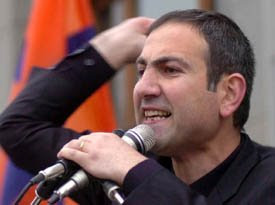In a recent radio interview, Kiro Manoyan explained why the ARF is (still) part of the coalition government - that is, to change it from the inside (see bottom of this post for a brief translation).
I suppose I shouldn't be surprised at this reasoning. I've heard it from ARF members who, when all logical explanations and defenses have crumbled, say they are part of this organizations because they want to change it, to better it, from the inside out. Of course, those who maintain their independent thinking, ie, those who continue to want to change it, are kicked out, either before or after they resign from the ARF. Which may in part be why those still in the ARF don't realize, or don't want to realize, that this strategy doesn't work. Imagine the consequences of accepting how much needs to changed inside the belly of the beast, for those those individuals, for the party, and for Armenians in general.
RFE/RL has posted an interview with one of its reporters, Kiro Manoyan and Sarkis Hatspanyan. Watch
Cognitive Dissonance and Insecure Identity try to prove itself against
Logic and Consistency. Its about 15 minutes long, watch the last half especially, it speaks for itself.
Video (scroll down on the linked page to see).
Here is the brief translation of an interview on RFE/RL from Oct 20:Interview with Kiro Manoyan (KM) with RFL reporter Karine Kalantaryan (KK).
the topic is NK and what concessions are being made on the part of Armenia. Arthur Baghdasaryan (Orinats Yergir, member of the coalition) said that neither the authorities in Armenia nor the president have any intention of making concessions.
The reporter, Karine Kalantaryan says that in Kiro Manoyan’s (member of ARF bureau and head of the Hye Tad office in Yerevan) interpretation the position of Azerbaijan on the NK issue depends on Ilham Aliev:
KM: If Aliev wants, he can impose his position, or convince those around him.
KK: Can you say exactly on whom the position of the Armenian side depends? On just Serjh Sargsyan or political forces? And what responsibility does the ARF bear in this case?
KM: Not everything depends on Armenia and in the case of Armenia not everything should depend on the position of the president because this is not a matter— like many other matters—where the president can make a decision on his own. It is imperative that all political forces clarify their positions. We have so far made our position clear, that we fundamentally oppose the current alternative under consideration fundamentally because there is the issue of returning the lands and because the return of those lands doesn’t guarantee any essential step in return. Whether or not it guarantees any essential steps in return, we are against the return of the lands.
[Reporter’s words] To the question of which part the ARF bears responsibility for, Kiro Manoyan did not answer. But he said that in the settlement of the NK issue, and not only in that, there are differences of opinion:
KM: Yes, there are differences of opinion on this issue, there always have been…..
[Reporter’s words]: There have been, and there are still, differences of opinion, not only on this issue, Kiro Manoyan stated. Then what keeps the ARF in the coalition?
KM: The opportunity we have to convince our colleagues to change their viewpoints. If we see that we no longer have that opportunity by being in the coalition, not just with respect to this issue, but there are many issues where we have a different position.....if we see that we can no longer influence, it would be clear that we have nothing more to do, not just on these issues, but any others as well where we see that is has gone over the limit, and our presence has no meaning anymore, it’s clear that we won’t stay [in the coalition]. So far we think we have an influence.
[Reporter’s words]: Life has shown that the coalition party has made public announcements about ‘going over the limit’ only during elections, during the last four years during the parliamentary and presidential elections by criticizing the authorities.
[Reporter’s words]: to the question of what influence the ARF has had on the position of government specifically with respect to NK and the return of territories in the last 4 years, and the issue of returning or not returning the lands, Kiro Manoyan again avoided the question, stressing that in the last four years and now,
KM: they are different presidents, different people, they’re different politically. Yes, we have had an influence, we have had an influence in many issues, not only concerning NK..
Somebody [not the reporter] in the background asked: specifically about NK issue?
KM: It makes no sense to say specifically, there is no need to open our internal kitchen here. But we have seen that we have hadinfluence and have kept our membership in the coalition.
In closing, the reporter quotes Kiro Manoyan as saying,
“Today, everything depends on the negotiations on NK and the position of Armenia to surrender or not surrender the territories”.





